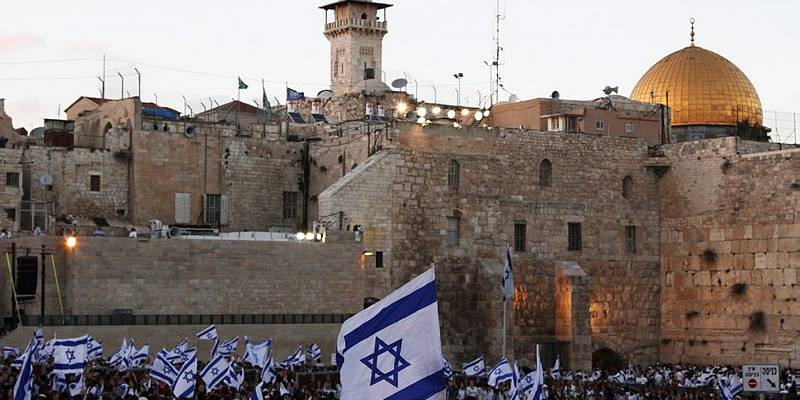“Jerusalem” and “Zion” represent the Jewish people and the non-Jewish nations of the world coming together to serve God and support the Jewish People in the Land that He gave them.
Jerusalem day is a national Israeli holiday commemorating the reunification of Jerusalem and the establishment of Israeli control over the Old City following the IDF victory in the 1967 Six Day War. The day is officially marked with state ceremonies and memorial services.
Many in the Jewish community have attached much religious significance of Jerusalem Day, and thanksgiving prayers are held. The highlight of the day is the flag parade through the streets of the Old City, starting on the western side and proceeding through the eastern side until reaching the Western Wall, where a massive open air celebratory concert then takes place.
“Jerusalem” is actually only one of 72 names for the Holy City, although “Jerusalem” and “Zion” are the most famous. Allow me to share with you the meaning of these two names and what each one represents.
The verse says “For the Torah will go forth from Zion and the word of God from Jerusalem” (Isaiah 2:3). Let us discuss the difference between “Zion” and “Jerusalem” and explore what the difference is between “Torah” and the “Word of God”?
For starters, while “Zion” and “Jerusalem” both refer to the capital of Israel, they represent different aspects of the holy city. The word “Zion” literally means “marked” or “distinct.” In this way, Zion refers to the unique qualities and character traits that distinguish the Jewish people from the rest of the world. By extension, Zion represents the Jerusalem that belongs to the Jewish people. It is a personal reference to the city, a type of “keeping it in the [Jewish] family.”
The name “Jerusalem,” on the other hand, indicates the city’s role as a spiritual center for all nations of the world. Hence, by extension, Jerusalem represents the spirit of God, Torah and the Jewish people influencing the rest of the world. “Zion” connects the Jews to the Holy City, “Jerusalem” connects the Gentiles to it. Jerusalem is a public reference to the city, allowing it to be shared with the rest of the world.
Furthermore, “Torah” (in the verse cited above) represents the laws of the Torah which are exclusively for the Jews to observe. Indeed, with minor exception, the commandments of the Torah are for Jews. If a non-Jew wants to keep kosher, for whatever reason, that’s fine, but it is completely permissible for non-Jews to eat bacon, shrimp and cheeseburgers. “The word of God,” however, represents those commandments of the Torah that apply to the entire world. There are seven of these commandments, such as the requirement for all mankind to believe in the God of Israel and the prohibition against murder. These mitzvot are binding on everyone.
As such, “Jerusalem” and “Zion” represent the Jewish people and the non-Jewish nations of the world coming together to serve God and support the Jewish People in the Land that He gave them!
Whichever way you look at it, Jerusalem is for the entire world! Come on over and claim your portion! As the prophet says, “I will bring them to my holy mountain, and make them joyful in my house of prayer, their burnt offerings and their sacrifices shall be accepted upon My altar, for My house shall be a house of prayer for ALL people.” (Isaiah 56)










